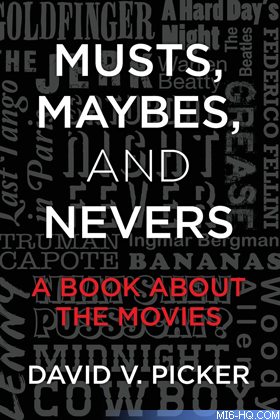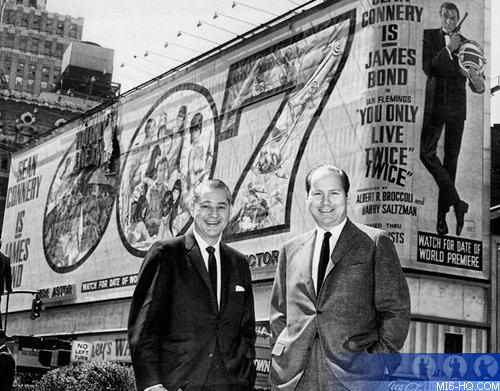Musts Maybes and Nevers - Review
21st April 2014
Guest writer Edward Biddulph reviews the autobiography of UA's David Picker, the man who green-lit 'Dr. No'
As head of production at United Artists, David V Picker's job was to identify worthwhile and potentially profitable projects, help develop them, secure the money, and ensure that the films were delivered on time and to budget. Among the films he 'green-lit' were "Midnight Cowboy", "A Hard Day's Night", and, to the gratitude of millions of Bond fans, "Dr No".
"Musts, Maybes, and Nevers: A Book About the Movies" by film producer and studio executive David Picker is not only a fascinating and entertaining memoir, but a history of Hollywood. Desribing his life in the industry from working in the publicity department of United Artists in 1952 (he escorted Grace Kelly to a photo session) to sitting on the boards of the biggest studios, the book has all the ingredients of the best Hollywood epics - the triumphs, the failures, the people, and the politics. There is also room for one fictional character that defined a genre - James Bond. David Picker's account of how he said yes to "Dr No" (1962) offers an interesting perspective to the well known, and complex, story of how Fleming's novels made it to the screen (big and small), involving false starts, split ownership of rights, expiring options, and Fleming's sometimes casual way of doing business. There is one aspect of Picker's tale, however, that differs from the standard narrative: the question of why "Dr No" and not "Thunderball" was chosen as the first Bond film. In his autobiography, "When the Snow Melts" (1998), Cubby Broccoli tells us that he and co-producer Harry Saltzman decided to film "Thunderball" as the first Bond film, but switched to "Dr No" to avoid legal complications when Kevin McClory, who had co-written the screen treatments on which Fleming's novel was based, filed an injunction to stop the film's development. |
|
According to David Picker, however, the issue was simply about money. United Artists set a budget of $1.1 million and David Picker felt that "Thunderball" would be too expensive to film. "Dr No", on the other hand, seemed more affordable. Picker implies that the suggestion of "Dr No" was his and that he persuaded Broccoli and Saltzman to consider the change.
"Terence was the living embodiment of James Bond - his style of dress, his style of life - he could have played James Bond himself." - David Picker, talking to MI6 Confidential.
David Picker also offers a different perspective to that maintained by Broccoli on the fractious relationship between the Bond producers and Sean Connery towards the end of Connery's initial tenure as Bond. Picker is firmly on Connery's side, stating that Connery was treated badly by Saltzman and Broccoli. The relatively poor box-office performance of "On Her Majesty's Secret Service" (1969), starring George Lazenby, convinced Picker that the Bond series was in serious trouble. His solution was to tempt Connery back to Bond with offers of films and an unpreceded (at the time) $1 million paycheck.
|
In a business where agreements were sealed with a handshake and a person's word (at least at United Artists), David Picker often writes about the very high value he places on honesty. So when Picker belatedly discovered that Broccoli and Saltzman were barely on speaking terms with Connery as the cameras began to roll on "Diamonds Are Forever" (1971), he was hurt that the producers, he felt, had not been honest with him.
Broccoli and Saltzman escape Picker's displeasure rather lightly. Bill Cosby, who Picker claims was less than honest about his role in the failure of the Cosby vehicle, "Leonard Part 6" (1987), does not fare so well ("I'm sure in his [Cosby's] head (surely not his heart - wherever that might reside) he was entitled to every nickel." Nor does Robert Altman, who Picker describes in derogatory terms for taking credit for Picker's descision to re-market "The Long Goodbye" (1973), turning a potential flop into a hit.
Away from the politics, "Musts, Maybes, and Nevers" is a celebration of the movies, as much its failures as its successes. In an industry where success is unpredictable, the poor decisions go hand in hand with the ones that pay off. David Picker turned down "Star Wars" and "The Graduate" on behalf of United Artists, but he oversaw some of Woody Allen's funniest work, among them "Bananas" (1971) and "Sleeper "(1973), gave Steve Martin his break in films with "The Jerk" (1979), and nurtured Dustin Hoffman's career through films such as "Midnight Cowboy" (1969) and "Lenny" (1974).
The book promises to set the record straight, and by the end of this very frank and hugely enjoyable account, I felt that David Picker had succeeded. It is essential reading for students of the history of the Bond films, but should be read by anyone interested in the movie industry behind the silver screen.
MI6 Confidential recently spoke to the author and producer David Picker about his time with 007. Issue #25 is now shipping around the world from mi6confidential.com.
Share The Story
The opinions expressed in this review are those of the author and do not necessarily reflect those of MI6-HQ.com or its owners.










